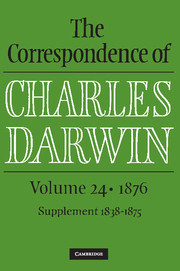Introduction
Published online by Cambridge University Press: 30 December 2016
Summary
The year 1876 started out sedately enough with Darwin working on the first draft of his book on the cross- and self-fertilisation of plants, and the regularity of life in Down House measured by the ongoing tally of his and Emma's backgammon games. ‘I have won, hurrah, hurrah, 2795 games’, Darwin boasted; ‘my wife … poor creature, has won only 2490 games’ (letter to Asa Gray, 28 January 1876). Francis Darwin, happily established in Down Lodge with his wife, Amy, had settled in as his father's botanical assistant, and their close working relationship is evident in their correspondence whenever one or the other was away from Down. The usual rhythm of visits with family and friends took place against the constant backdrop of advice and cosseting regarding the ailments that were so much a feature of Darwin family life. But the calm was not to last, and the second half of 1876 was marked by anxiety and deep grief. In May, William Darwin suffered a serious concussion from a riding accident, and George Darwin's ill-health grew worse, echoing Darwin's own chronic condition. But it was in September, when Darwin was finishing work on the second edition of Orchids and checking the page-proofs of Cross and self fertilisation, that the family suffered a devastating loss. The Darwins must have spent much of the year anticipating the birth of the first member of the next generation of the family, with Francis and Amy's child expected in September. Their joy at the safe delivery of a healthy boy was soon replaced by anguish when Amy died four days later. ‘I cannot bear to think of the future’, Darwin confessed to William on 11 September just hours after Amy's death. For once, the labour of checking proofs proved a blessing, as Darwin sought solace for the loss of his beloved daughter-in-law and relief from his anxiety about Francis. By the end of the year there was a different order at Down House with Francis and his baby son Bernard now part of the household, and Darwin recasting his work on dimorphic and trimorphic plants in new ways.
- Type
- Chapter
- Information
- The Correspondence of Charles Darwin , pp. xvii - xxixPublisher: Cambridge University PressPrint publication year: 2016



